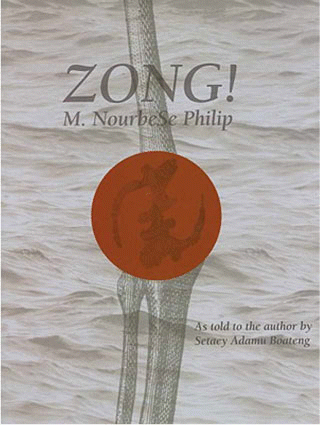The moan of 'Zong!'

song long ago a tale was
told with no begin or end where
s the port and what
my part come
(from Zong!, M. NourbeSe Philip)
In that tenuous suspension between what is about to be silent and what is about to be spoken M. NourbeSe Philip intonates, makes utterances, working in and out of this impossible suspension: “…only if language bears witness to something to which it is impossible to bear witness, can a speaking being experience something like a necessity to speak.” (G. Agamben)
The song that is Zong! cannot be written about or described; it must be experienced. Because it sings for those who cannot speak, but must speak. Because Philip wades, swims, dives into the language of a law document and turns it oceanic, turbulent, makes the rock of law into the aquifer of moan.
“But who exactly possesses [language]? Ad whom does it possess? Is language in possession, ever a possessing or possessed possession? Possessed or possessing in exclusive possession, like a piece of personal property?” (Jacques Derrida)
In 1781, the captain of the slave ship Zong ordered that 150 African slaves be thrown overboard, murdered by drowning, so that the ship’s owners could collect money on their insurance. In writing Zong!, Philip was entirely dependent on the language of the two-page document Gregson vs. Gilbert, the only public legal document related to this slaughter.
“I have always suspected the law, as well as language, of being mad, of being, at any rate, the unique place and the first condition of madness.” (J. Derrida)
The song that is cannot be writ or scribed it must
experience cause ing who cannot s ea , but must s ea .
e au lip ade s in the langu e of law
lent s h ock of law to aqu a .
Philip grains the seeds of English, and in so doing changes it. And what is now her English, both silent and voiced, changes us. If we stop here, how will we inhabit this silence? ( ) Will we become uncomfortable? ( ) Will we finally be able to really hear the many Englishes with which we utter? ( ) On the eve of murderous drownings can we decolonize our English? ( ) In Zong!, Philip collides memory, history and law, troubles the properties of document to give voice to voices, render subjectivities to those who had been made into property. In that tenuous suspension between what is about to be silent and what is about to be spoken, Philip waters, sings, tunes, dins, sobs, sows and pauses. We pause with her in this fracture and ligature political.
song th is b itten rib
peri s h not
into law
s e e k f l int of moan
M. NourbeSe Philip is a poet, writer and lawyer, born in Tobago, now living in Toronto. She is the author of several collections of essays, prose, drama and poetry including She Tries Her Tongue, Her Silence Softly Breaks, Harriet’s Daughter and Zong!, a work where memory, history, and law collide and metamorphose into the poetics of the fragment.
Folding Borders: Experimenting in the Canadian Laboratory